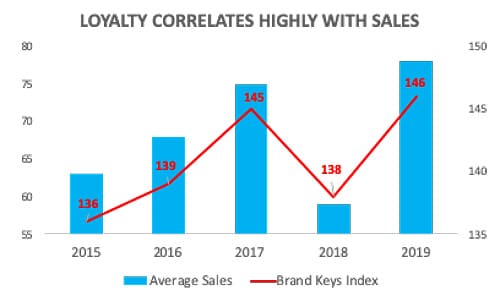If you’re a regular reader of The Wise Marketer you may have noticed a few themes and a few personalities that show up with some frequency. One of those personalities is Robert Passikoff, founder and CEO of Brand Keys. He and I have had a series of animated conversations over the past several months – mostly related to his company’s latest loyalty leaders list.
By: Mike Giambattista, CLMP & Contributor
For the past 2-plus decades, Brand Keys has been measuring brand loyalty, and the changes & effects those loyalty indices have had on brand performance and sales. Ask anyone in the loyalty space and they’ll tell you that loyalty can be a very difficult thing to measure and even more difficult to measure its effect on sales. But that’s what Brand Keys has been doing with remarkable, provable accuracy and it’s also what makes Robert a walking wealth of loyalty, consumer psychology, and brand information.

Brand Keys 2019 Loyalty Leaders List
We got an early look at Brand Keys’ latest research and its very telling. According to Passikoff, their Media GPS platform measure “sets of category specific drivers that exist for every category, e.g., values that define how consumers view a category, compare brands, and buy in a category, and which will be most influenced by one medium versus another. Additionally, the metrics provide the percentage contribution that each media platform makes to generating awareness, enhancing recall, brand engagement, and ultimately, sales.”
The 23rd annual Brand Keys Loyalty Leaders List has identified the most diverse inventory of Top 100 brands as loyalty leaders in over a decade. The annual survey examined brands in 110 categories providing a unique set of data on loyalty, emotional engagement, and brand communications. Here are the 2019 Top 20 Loyalty Leaders (the numbers in parentheses indicate their 2018 loyalty ranking).
- Amazon: online retail (#1)
- Google: search engines (#2)
- Samsung: smartphones (#6)
- Amazon: tablets (#9)
- Apple: tablets (#7)
- Netflix: video streaming (#4)
- Amazon: video streaming (#5)
- Apple: smartphones (#3)
- Trader Joe’s: natural food retail (#10)
- Hyundai: automotive (#14)
- Twitter: social networking (#23)
- WhatsApp: instant messaging (#11)
- Chick-fil-A: casual/fast-casual (#24)
- Dunkin’: out-of-home coffee (#19)
- Domino’s: pizza (#12)
- Ford: automotive (#15)
- Nike: athletic footwear (#18)
- Discover: credit cards (#26)
- Avis: car rental (#21)
- Toyota: automotive (#22)
The 2019 survey examined 26 media platforms for strategic allocation of marketing resources and accommodates drill-down into specific venues. The media platforms include: television, newspapers, B2B publications, OTT, radio, and out-of-home; digital include: mobile, social, apps, and search identifying where and to what extent – one media platform will be more efficient than others, based on consumers’ actual exposure to brand advertising and marketing.
Loyalty Winners
Brands that exhibited the largest loyalty leaps this year included Old Navy (+23), Sam’s Club (+16), Spotify (+15), Twitter (+12), Chick-fil-A (+11), MSNBC (+11), FOX (+10), Kia (+10), Discover (+8), and Samsung (+8).
Loyalty Losers
The brands with the greatest loyalty erosion, affecting their ranks in the Top 100, included iTunes (-27), Uber (-26), YouTube (-22), Under Armour (-21), Facebook (-16), Ketel One (-16), Tito’s (-16), Line (-11), Panera (-11), and Nissan (9).
According to Passikoff, “When it comes to loyalty, no matter the category or audience, brands that understand emotional connections can serve as surrogates for added-value and always out-perform the competition,” noted Passikoff. “Brands that make loyalty and emotional engagement a strategic priority always appear high on the Loyalty Leaders List, and more importantly, always appear atop consumers’ shopping lists.”
Also Read: How to Recover Brand Loyalty after Disaster


